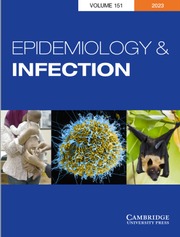Article contents
The immunization of mice, calves and pigs against Salmonella dublin and Salmonella cholerae-suis infections
Published online by Cambridge University Press: 15 May 2009
Extract
1. Antisera prepared in rabbits or calves against live Salmonella dublin gave mice some degree of protection against oral infection with this organism. Both antiserum prepared against heat-killed S. dublin and dead vaccines prepared in a variety of ways produced little or no immunity.
2. A rough variant of S. dublin of low virulence for mice, no. 17 A, produced a reasonably good immunity against oral infection with S. dublin in mice but not in calves. Mice that survived injection with another rough variant that possessed a considerable degree of virulence for these animals, no. 51, were immune to oral infection with S. dublin. Experimentally and naturally, this variant and, to a lesser extent, 9S, a smooth variant of S. gallinarum of reduced virulence, produced an appreciable degree of immunity in calves against S. dublin infection; none of the calves injected with these variants showed any signs of ill-health as a result.
3. Two rough variants of S. cholerae-suis, nos. 3 and 6, possessed a considerable degree of virulence for mice; those that survived were resistant to oral infection with S. cholerae-suis. Experimentally and naturally, both variants produced an appreciable degree of immunity in pigs.
4. Mice that survived vaccination with the rough S. cholerae-suis variant no. 6 were resistant to oral infection with S. dublin. Those that survived vaccination with the rough S. dublin variant no. 51 were resistant to oral infection with S. cholerae-suis and S. typhi-murium; they were fully susceptible to parenteral administration of Escherichia coli and Erysipelothrix rhusiopathiae.
5. Vaccination with S. cholerae-suis variants 3 and 6 and S. dublin variant 51 provoked the formation of H but not O antibodies. These variants were never found to mutate from rough to smooth in vitro or in vivo.
- Type
- Research Article
- Information
- Copyright
- Copyright © Cambridge University Press 1965
References
- 62
- Cited by


